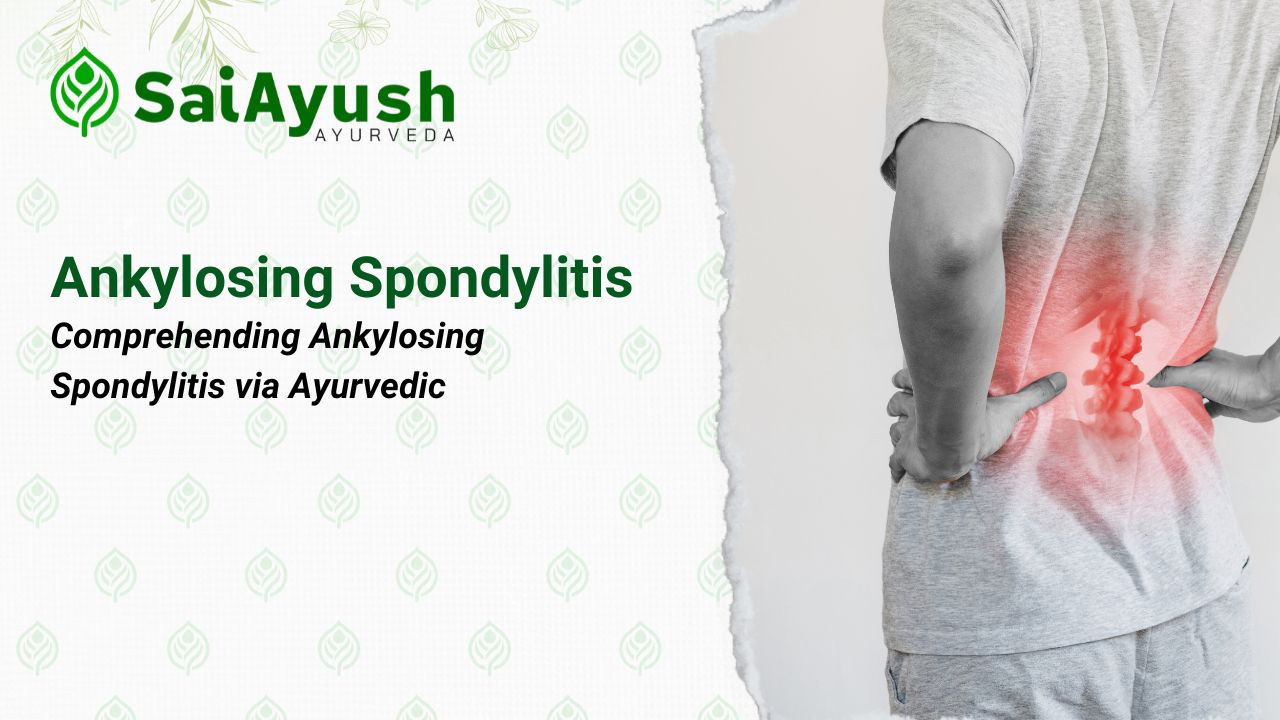Ankylosing spondylitis (AS) is a form of arthritis that primarily affects the spine, although it can impact other joints as well. This chronic inflammatory disease leads to the fusion of the vertebrae, resulting in reduced flexibility and mobility. While modern medicine offers various treatment approaches, Ayurveda provides a unique perspective on managing this condition, focusing on holistic and natural methods to alleviate symptoms and improve quality of life.
Causes of Ankylosing Spondylitis
In contemporary medicine, the exact cause of ankylosing spondylitis remains unclear. However, genetic factors play a significant role, with the HLA-B27 gene being a major contributor. Environmental factors and immune system abnormalities are also believed to influence the onset of AS.
Symptoms of Ankylosing Spondylitis
The symptoms of ankylosing spondylitis typically develop gradually and may vary among individuals. Common symptoms include:
- Chronic Back Pain: Persistent pain and stiffness in the lower back and hips, particularly in the morning or after periods of inactivity.
- Reduced Flexibility: Decreased mobility in the spine, leading to a stooped posture.
- Fatigue: Chronic fatigue due to inflammation and the body’s response to it.
- Eye Inflammation: Uveitis, or inflammation of the eye, causing pain, redness, and blurred vision.
- Joint Pain: Pain and swelling in other joints, such as the shoulders, hips, or knees.
Risk Factors for Ankylosing Spondylitis
Several factors can increase the risk of developing ankylosing spondylitis:
- Genetics: A family history of AS significantly raises the risk, particularly if the HLA-B27 gene is present.
- Age: AS commonly begins in late adolescence or early adulthood, typically between the ages of 17 and 45.
- Gender: Men are more likely to develop ankylosing spondylitis than women.
- Ethnicity: Certain ethnic groups, such as Caucasians, have a higher prevalence of AS, particularly those with the HLA-B27 gene.
Ayurvedic Perspective on Ankylosing Spondylitis
In Ayurveda, ankylosing spondylitis is understood as a Vata disorder. Vata dosha governs movement and the nervous system, and an imbalance in Vata can lead to conditions like AS. The disease is often associated with “Ama” (toxins) accumulation in the body and an imbalance in “Agni” (digestive fire), leading to inflammation and stiffness in the joints.
Ayurvedic Treatments for Ankylosing Spondylitis
Ayurveda offers a comprehensive approach to managing ankylosing spondylitis through diet, lifestyle changes, herbal remedies, and specific therapies. The goal is to balance the Vata dosha, eliminate Ama, and strengthen Agni.
- Dietary Modifications:
- Vata-Pacifying Diet: Emphasize warm, cooked foods that are easy to digest. Avoid cold, dry, and raw foods.
- Anti-inflammatory Foods: Include turmeric, ginger, and garlic in the diet to reduce inflammation.
- Hydration: Drink warm water and herbal teas to aid digestion and toxin elimination.
- Herbal Remedies:
- Ashwagandha: Known for its anti-inflammatory and rejuvenating properties, ashwagandha helps in reducing pain and stiffness.
- Guggulu: Effective in reducing inflammation and detoxifying the body.
- Shallaki (Boswellia Serrata): Helps in managing inflammation and improving joint health.
- Panchakarma Therapy:
- Abhyanga (Oil Massage): Regular oil massages with medicated oils like Mahanarayan oil can help in reducing stiffness and pain.
- Swedana (Herbal Steam Therapy): Helps in detoxification and relieving muscle tension.
- Basti (Medicated Enema): Vata-pacifying enemas with medicated oils or decoctions are beneficial for chronic Vata disorders like AS.
- Yoga and Exercise:
- Yoga: Specific asanas (postures) and pranayama (breathing exercises) can enhance flexibility, reduce pain, and promote overall well-being.
- Regular Exercise: Gentle exercises like swimming or walking help maintain mobility and reduce stiffness.
- Lifestyle Changes:
- Stress Management: Practices such as meditation and mindfulness can help in managing stress, which often exacerbates symptoms.
- Adequate Rest: Ensure sufficient rest and sleep to aid in the body’s healing processes.
Conclusion
Ankylosing spondylitis can significantly impact an individual’s quality of life, but Ayurveda offers a holistic approach to managing this condition. By focusing on balancing the Vata dosha, eliminating toxins, and enhancing digestion, Ayurveda provides natural and effective strategies to alleviate symptoms and improve overall health. Embracing these time-honored practices can lead to a better quality of life for those affected by ankylosing spondylitis.
Discover the healing power of Ayurveda with our latest article at Sai Ayush Ayurveda Hospitals! Dive into the age-old wisdom that can rejuvenate your body and mind. Click here to read more:



0 Comments